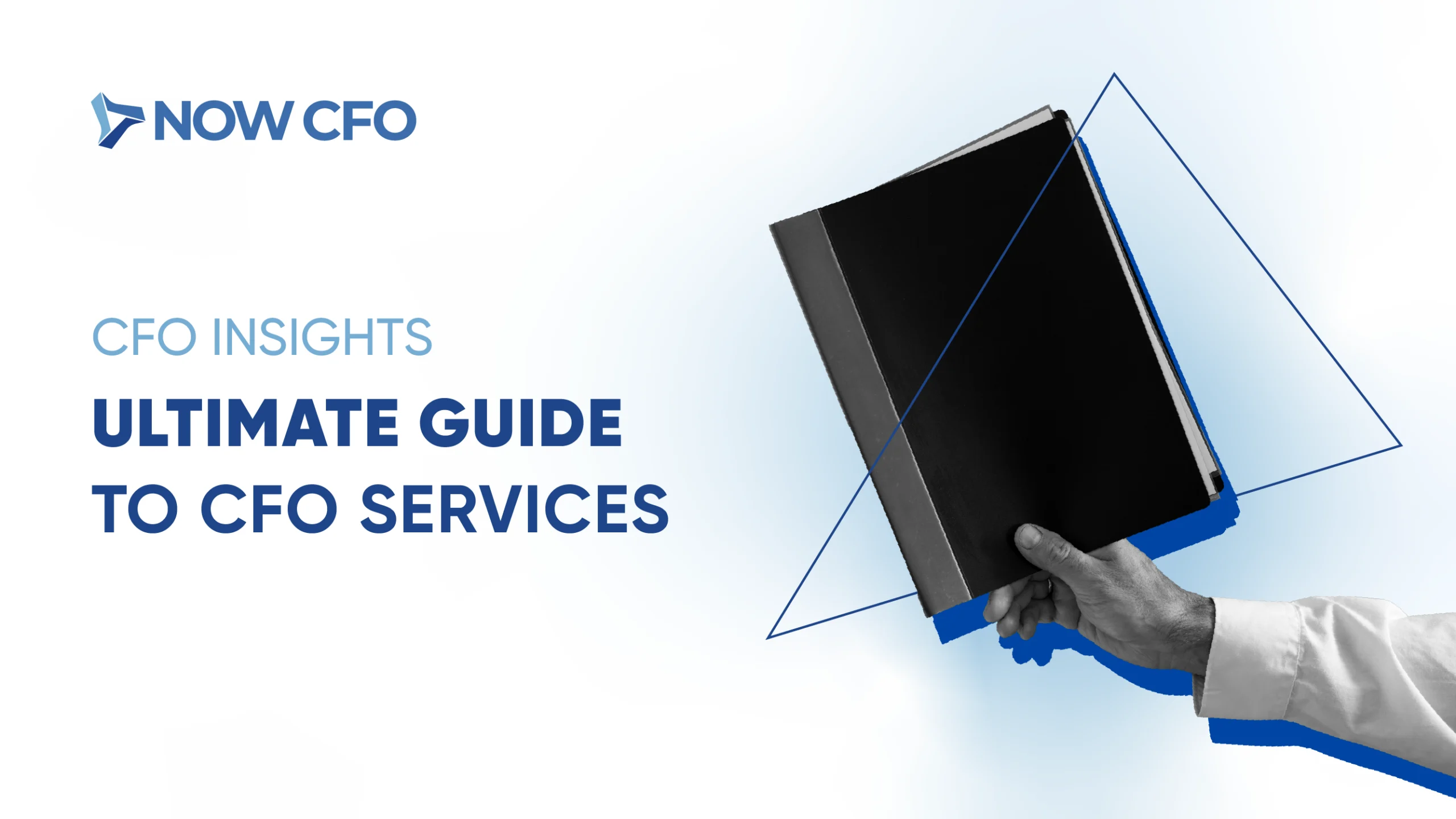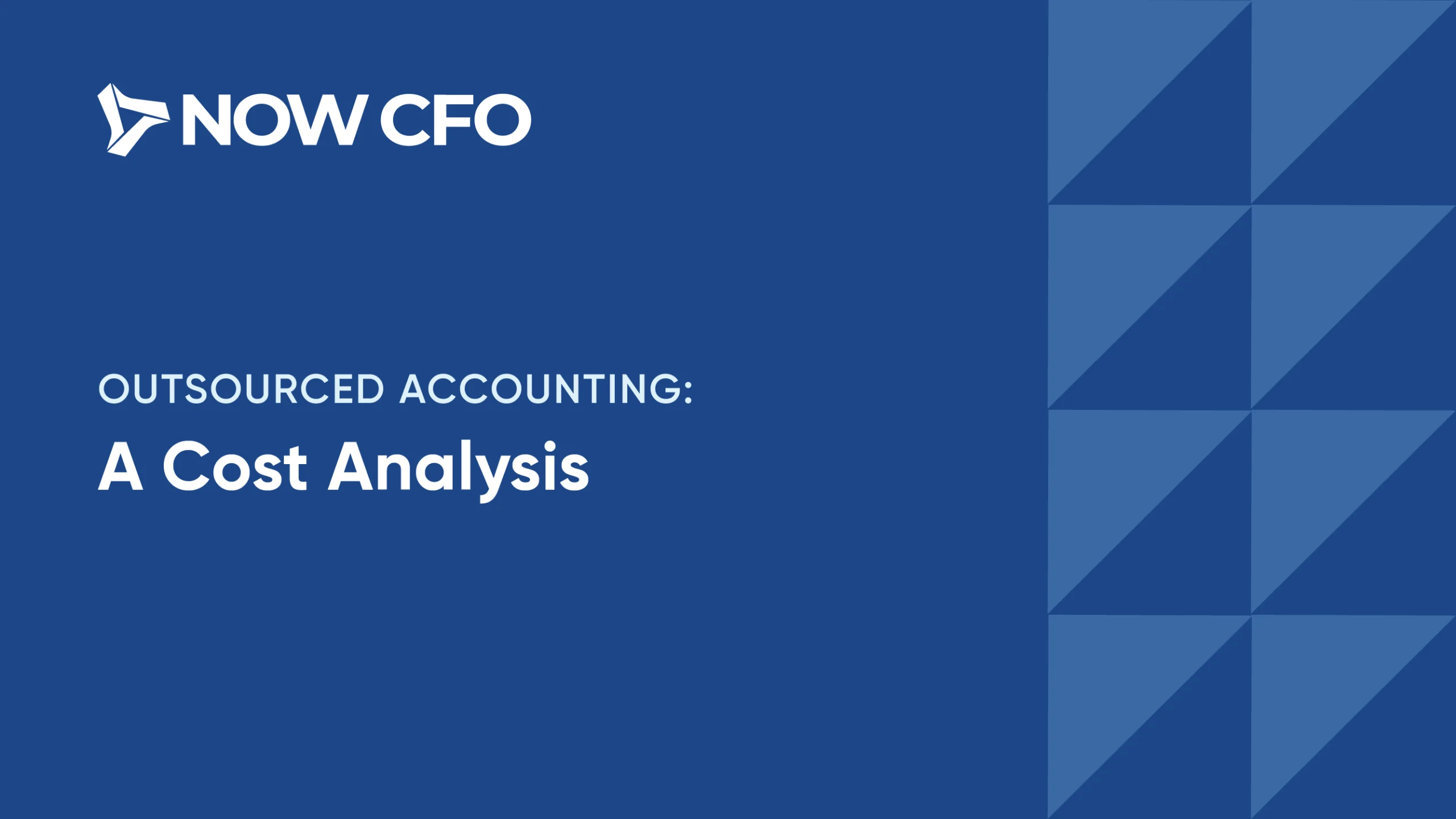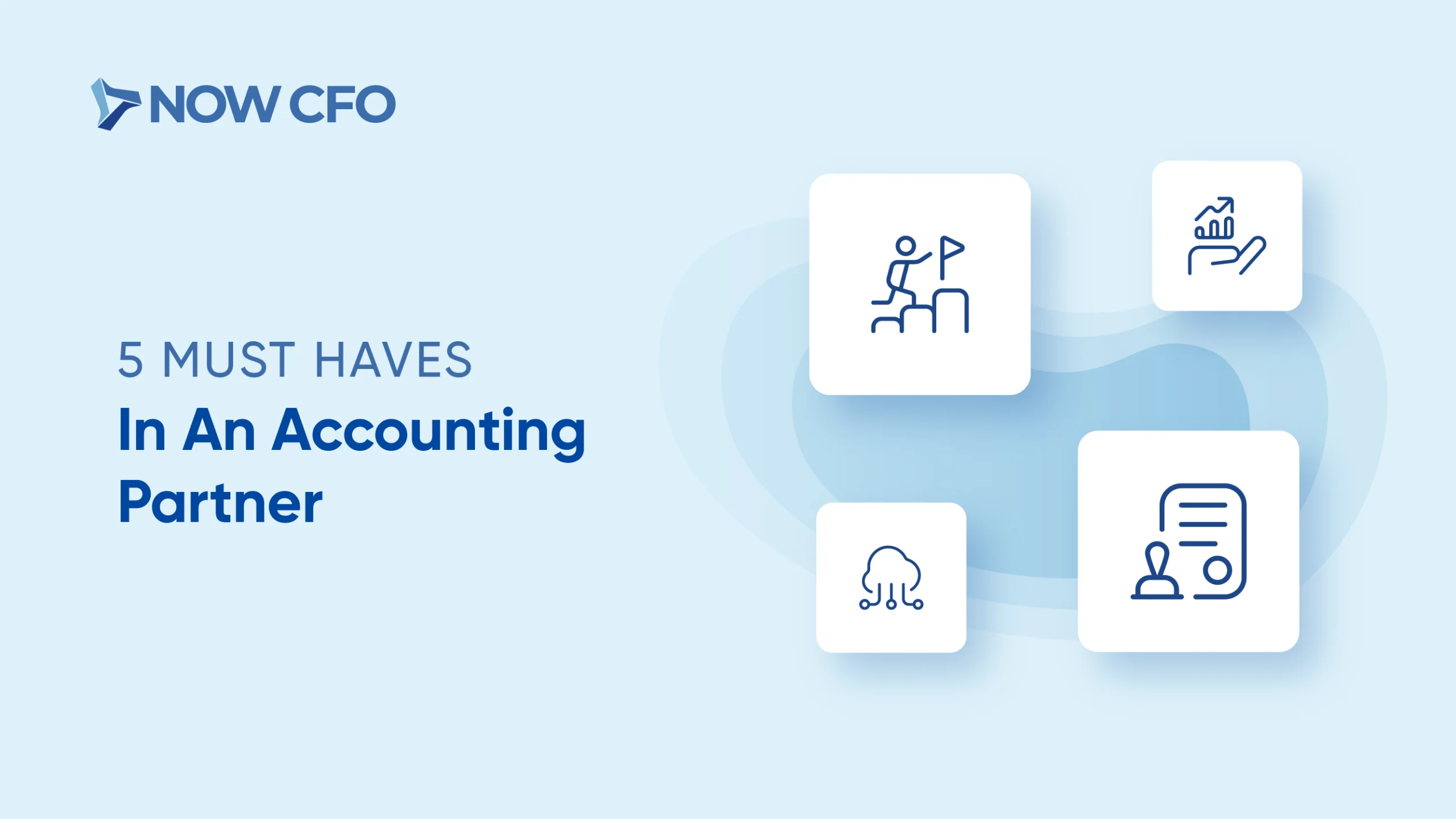
The demand for flexible and strategic financial leadership has never been higher. Companies are increasingly seeking cost-effective solutions without the overhead of a full-time executive.
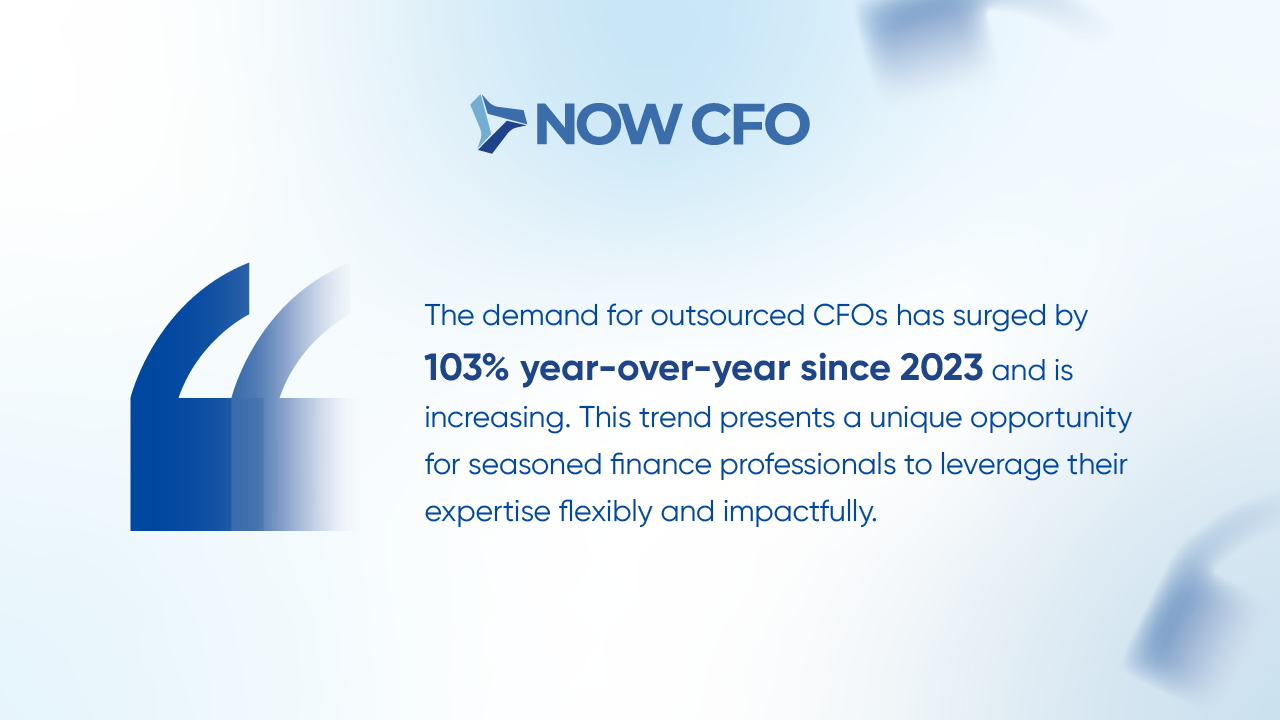
This shift has significantly increased the adoption of outsourced CFO consulting services. The demand for outsourced CFOs has surged by 103% year-over-year since 2023 and is increasing. This trend presents a unique opportunity for seasoned finance professionals to leverage their expertise flexibly and impactfully. Let’s look into how to become an outsourced CFO.
What is an Outsourced CFO?
Many startups and SMEs turn to an outsourced CFO for hire when they need strategic financial oversight but aren’t ready for a full-time executive. This section delves into the role of an outsourced CFO, the types of businesses that benefit from their services, and how they differ from fractional CFO jobs.
Defining the Outsourced CFO Role
An outsourced CFO is a financial expert contracted to provide high-level financial management, strategic planning, and advisory services to businesses on a part-time or project basis.
Unlike in-house CFOs, outsourced CFOs offer flexibility. They can be engaged as needed, making them an ideal solution for companies requiring financial expertise without a full-time executive’s overhead.
Key responsibilities include:
- Developing and implementing financial strategies
- Managing budgeting and forecasting processes
- Overseeing financial reporting and compliance
- Providing insights for investment and growth opportunities
Industries and Businesses That Use Outsourced CFOs
Outsourced and virtual CFO services are utilized across various sectors, particularly by SMEs that need strategic financial oversight without the cost of a full-time CFO.
Industries that commonly engage outsourced CFOs include:
- Technology and startups
- Healthcare and medical practices
- Manufacturing and distribution
- Non-profit organizations
- Professional services firms
Difference Between Outsourced and Fractional CFOs
While both outsourced CFOs and fractional CFO jobs provide part-time financial leadership, their engagement models differ.
Outsourced CFO
- Engaged on a project or on an as-needed basis
- Focuses on specific financial challenges or initiatives
- Offers flexibility regarding engagement duration
Fractional CFO
- Works with a company on a recurring, part-time schedule
- Provides ongoing financial oversight and strategic planning
- Becomes an integral part of the management team
Understanding these differences helps businesses choose the right financial leadership model to suit their unique needs.
Who Should Consider Becoming an Outsourced CFO?
As the demand for strategic financial leadership grows, many finance professionals are exploring becoming an outsourced CFO. This role offers a unique blend of autonomy, diverse client engagements, and the opportunity to apply seasoned expertise across various industries.
Ideal Background and Experience
Professionals best suited for the outsourced CFO role typically possess:
- Extensive Financial Expertise: A solid foundation in accounting principles, financial analysis, and strategic planning.
- Leadership Experience: Previous roles in financial leadership positions, such as controllers or finance directors.
- Industry Versatility: Exposure to multiple industries enhances adaptability and broadens the scope of potential client engagements.
Transitioning from Controller or Corporate CFO Roles
Moving from a traditional corporate role to an outsourced CFO position involves a shift in mindset and operations:
- From Internal to External: Instead of serving a single organization, you’ll manage multiple clients with distinct challenges and goals.
- Entrepreneurial Approach: Building a personal brand, marketing services, and establishing a client base become integral parts of the role.
- Flexible Engagements: Engagements may range from short-term projects to long-term advisory roles, requiring adaptability and proactive client management.
Benefits of Working Independently
Embracing the outsourced CFO model offers several advantages:
- Autonomy: Control your schedule, client selection, and service offerings.
- Diverse Experiences: Exposure to different industries and business models enhances professional growth.
- Financial Rewards: Potential to earn competitive compensation while managing workload and engagements.
Common Client Types and Engagements
As an outsourced CFO, you’ll collaborate with a variety of clients, including:
- Startups: Assisting with financial modeling, fundraising strategies, and establishing financial systems.
- SMEs: Providing ongoing financial oversight, budgeting, and strategic planning.
- Non-Profit Organizations: Ensuring compliance, managing grants, and optimizing financial operations.
Earning Potential and Flexibility
An outsourced freelance CFO career path is lucrative and flexible:
- Competitive Compensation: According to ZipRecruiter, the average annual salary of a work-from-home outsourced CFO is around $250,000.
- Flexible Scheduling: Ability to set your hours and choose engagements that align with your expertise and interests.
- Scalable Opportunities: Potential to expand services, build a team, or specialize in niche markets to increase income streams.
Skills and Qualifications You Need
As the duties of financial leadership evolve, professionals aiming to become an outsourced CFO must cultivate a diverse skill set beyond traditional accounting. This role demands technical proficiency, strategic insight, and effective communication to deal with complex financial terrains and drive growth.
Core Technical Finance Skills
An outsourced CFO must possess robust technical skills to analyze financial data, develop budgets, and cash flow strategies. Financial reporting and forecasting proficiency are essential to provide accurate insights and guide strategic decisions.
These skills enable the CFO to identify trends, assess risks, and recommend actionable solutions that align with the company’s objectives.
Strategic Planning and Decision-Making
Beyond number crunching, an outsourced CFO is pivotal in shaping business strategy. This involves conducting market analyses, evaluating investment opportunities, and implementing risk management practices.
Communication and Advisory Skills
Effective communication is crucial for an outsourced CFO to convey financial insights to non-financial stakeholders. This includes simplifying complex data, engaging with stakeholders, and providing strategic advice.
Strong interpersonal skills foster collaboration and informed decision-making across the organization.
Knowledge of Accounting Automation Tools
Proficiency in modern accounting systems enhances efficiency and accuracy. An outsourced CFO should be adept at:
- ERP Systems: Utilizing platforms like QuickBooks or NetSuite for integrated financial management.
- Automation Tools: Implementing software to streamline repetitive tasks and reduce errors.
- Data Analytics: Leveraging analytical tools to derive actionable insights.
Optional Certifications and Licenses (CPA, CMA, MBA)
While not mandatory, specific certifications can enhance credibility:
- Certified Public Accountant (CPA): Demonstrates expertise in accounting principles.
- Certified Management Accountant (CMA): Focuses on financial planning and analysis.
- Master of Business Administration (MBA): Provides a broad understanding of business operations.
According to a survey, 50% of CFOs in Fortune 500 and S&P 500 companies hold MBA degrees, 35% have CPA credentials, and 11.2% hold both designations.
Familiarity with GAAP, Compliance, and Reporting
GAAP ensures transparency and consistency in financial reporting. An outsourced CFO must ensure compliance with financial regulations, implement internal controls, and prepare accurate reports.
GAAP compliance is crucial for building stakeholder confidence and securing financing.
Steps to Becoming an Outsourced CFO
Transitioning into the role of an outsourced CFO involves a strategic approach to establish a successful practice. This section outlines the essential steps to guide professionals through this journey.
Assessing Your Readiness and Career Goals
Before becoming an outsourced CFO, evaluating your skills, experience, and objectives is crucial.
- Self-Assessment: Determine if you possess financial acumen, leadership qualities, and adaptability to manage multiple clients.
- Goal Setting: Define your career aspirations, whether achieving work-life balance, financial independence, or industry specialization.
Creating a Services Framework and Pricing Model
Establishing a clear framework for your services and pricing is vital.
- Service Offerings: Identify the specific services you’ll provide, such as financial planning, budgeting, or compliance.
- Pricing Strategy: Develop a pricing model that reflects the value of your services and meets market expectations.
Setting Up Your Business Legally and Financially
Properly establishing your business ensures legal compliance and financial stability.
- Legal Structure: Choose an appropriate business structure (e.g., LLC, sole proprietorship) and register accordingly.
- Financial Systems Integration: Set up accounting systems, banking arrangements, and tax identification numbers.
Marketing Yourself to Attract Clients
Effective marketing strategies are essential to build your client base.
- Brand Development: Create a professional brand identity, including a logo, website, and marketing materials.
- Online Presence: Utilize digital platforms like LinkedIn and industry-specific forums to showcase your expertise.
37% of SMEs outsource at least one business process, highlighting a significant market for outsourced CFO consulting services.
Building a Network Through Referrals and Partners
Networking plays a pivotal role in expanding your reach.
- Professional Associations: Join industry groups and attend events to connect with potential clients and collaborators.
- Referral Programs: Establish partnerships with other professionals who can refer clients to your services.
These connections can lead to new opportunities and sustained growth for your outsourced CFO practice.
Managing Multiple Client Engagements Efficiently
Balancing multiple clients requires adequate time and resource management.
- Workflow Systems: Implement project management tools to track tasks and deadlines.
- Client Communication: Maintain regular updates and meetings to ensure alignment and satisfaction.
Efficient management ensures high-quality service delivery across all client engagements.
Tools and Technology Every Outsourced CFO Needs
Today, an outsourced CFO must leverage advanced tools and technologies to deliver strategic financial insights and drive organizational growth. This section explores essential platforms and software that enhance efficiency and decision-making capabilities.
Accounting and ERP Platforms (QuickBooks, NetSuite, etc.)
A robust accounting or ERP system is fundamental for an outsourced CFO to manage financial operations effectively.
- QuickBooks: Preferred by most small business accountants for its user-friendly interface and comprehensive features.
- NetSuite: Recognized as the most utilized ERP for small businesses, offering scalability and cloud-based deployment.
FP&A Tools for Forecasting and Modeling
Financial Planning and Analysis (FP&A) tools are critical for creating accurate forecasts and financial models.
- Data rails: Offers AI-powered features like FP&A Genius, enhancing budgeting and strategic forecasting processes.
- Vena Solutions: Provides AI-driven solutions to streamline FP&A tasks and improve data analysis.
Document Management and Collaboration Platforms
Efficient document management and collaboration tools are essential for maintaining organized records and facilitating teamwork.
- Microsoft SharePoint: Enables secure document storage and real-time collaboration.
- Google Workspace: Offers cloud-based solutions for document creation and sharing. The rise of cloud-based tools has made it easier than ever for a remote CFO business to support clients across different time zones and industries.
Approximately 79% of employees use document management systems with collaborative features to enhance teamwork.
CRM Systems for Client Management
CRM systems help outsourced CFOs maintain client information and track interactions.
- Salesforce: Provides comprehensive tools for managing client relationships and sales pipelines.
- HubSpot: Offers user-friendly CRM solutions suitable for small to medium-sized businesses.
Reporting and Dashboard Solutions
Effective reporting and dashboard tools enable outsourced CFOs to present financial data clearly and make informed decisions.
- Tableau: Facilitates data visualization and interactive dashboards.
- Power BI: Integrates with various data sources to provide comprehensive business insights.
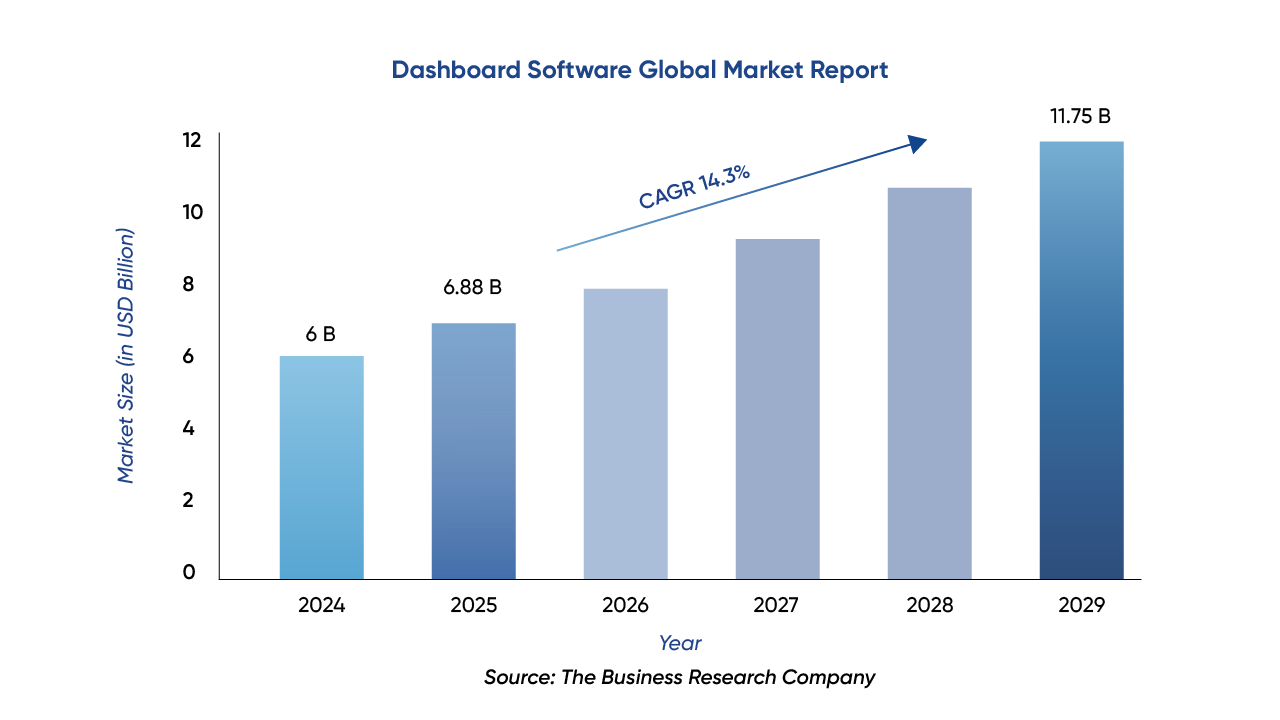
Growing and Scaling Your CFO Practice
Scaling your outsourced CFO practice requires a strategic approach to identify your niche, streamline operations, build a competent team, client acquisition, and diversify services. This section outlines key steps to achieve sustainable growth.
Identify Your Niche and Ideal Clients
Focusing on a specific industry or client type allows you to tailor your services effectively.
- Industry Specialization: Concentrate on sectors like technology startups, healthcare, or manufacturing to leverage industry-specific knowledge.
- Client Profiling: Determine businesses’ size, revenue, and operational complexity that align with your expertise.
Develop Scalable Processes and SOPs
Establishing standardized procedures ensures consistency and efficiency.
- Documentation: Develop comprehensive SOPs for recurring tasks.
- Automation: Implement tools for automated reporting, invoicing, and data analysis.
These measures facilitate seamless onboarding of new clients and maintain service quality as your practice grows.
Build a Competent Team or Collaborate with Subcontractors
Expanding your team enables you to manage an increased workload and offer diverse services.
- Subcontracting: Engage freelance accountants or analysts for specific projects.
- In-House Hiring: Recruit full-time staff to build a cohesive team.
Retain Clients and Expand Accounts
Maintaining strong client relationships is crucial for long-term success.
- Regular Communication: Schedule periodic reviews to discuss financial performance and address concerns.
- Value Addition: Offer insights and recommendations beyond standard reporting to demonstrate commitment to client growth.
These practices foster trust and encourage clients to engage your services for extended periods.
Diversify Service Offerings
Expanding your range of services can attract a broader client base and increase revenue.
- Advisory Services: Provide strategic planning, risk management, and investment analysis.
- Compliance and Taxation: Offer assistance with regulatory compliance and tax planning.
Implementing these strategies positions your outsourced CFO practice for scalable growth and sustained success.
Common Challenges and How to Overcome Them
The role of an outsourced CFO comes with unique challenges that require strategic approaches to overcome. This section examines common obstacles and offers practical solutions to ensure success in this dynamic position.
Managing Client Expectations and Deliverables
Clear communication is vital when setting client expectations.
- Define Scope Clearly: Establish detailed contracts outlining services, timelines, and responsibilities.
- Regular Updates: Provide consistent progress reports to keep clients informed.
- Feedback Loops: Encourage open dialogue to address concerns promptly.
These practices help prevent misunderstandings and ensure alignment between client needs and deliverables.
Balancing Multiple Clients and Work-Life
Juggling multiple clients requires effective time management and self-care.
- Prioritize Tasks: Use tools like the Eisenhower Matrix to distinguish between urgent and important tasks.
- Set Boundaries: Establish clear working hours and communicate them to clients.
- Delegate When Possible: Assign tasks to team members to distribute workload evenly.
Staying Current with Industry Changes
Staying up to date with the current industry trends requires continuous learning.
- Professional Development: Stay informed by attending workshops, webinars, and conferences.
- Subscribe to Industry Publications: Regularly read journals and newsletters for updates.
- Network with Peers: Engage in professional communities to share knowledge and experiences.
Pricing and Scope Creep
Managing pricing and preventing scope creep is crucial for profitability.
- Transparent Pricing Models: Clearly outline costs and services in contracts.
- Monitor Project Scope: Regularly review project parameters to prevent unauthorized expansions.
- Implement Change Orders: Use formal processes to manage additional requests.
These measures help maintain financial integrity and client satisfaction.
Building Credibility Without a Large Firm Name
Establishing trust as an independent professional requires deliberate efforts.
- Showcase Expertise: Publish case studies and thought leadership articles.
- Leverage Testimonials: Collect and display client feedback to build credibility.
- Engage in Speaking Opportunities: Participate in industry events to enhance visibility.
Building a strong personal brand fosters trust and attracts potential clients.
Conclusion: Taking the Leap into an Outsourced CFO Career
Pursuing a career as a part-time CFO unlocks the opportunity to apply your financial expertise flexibly and impactfully. We hope this guide on how to become an outsourced CFO is insightful.
If you’re ready to take the next step, Now CFO can help you get started. We’ve helped countless professionals transition into outsourced finance leadership roles with the tools, support, and client connections they need to grow. Explore open opportunities or partner with our finance consulting team.




